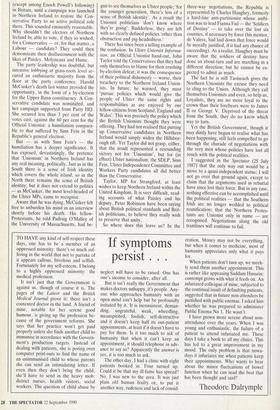If symptoms
persist . . .
TO HAVE any kind of self-respect these days, one has to be a member of an oppressed minority: there's so much suf- fering in the world that not to partake of it appears callous, frivolous and selfish. Fortunately for my self-esteem, I belong to a highly oppressed minority: the medical profession.
It isn't just that the Government is against us, though of course it is. The pages of the Lancet and the British Medical Journal prove it: there isn't a contented doctor in the land. A friend of mine, notable for her serene good humour, is giving up the profession be- cause of the government reforms. She says that her practice won't get paid properly unless she finds another child to immunise in accordance with the Govern- ment's production targets. Instead of dealing with patients, she is poring over computer print-outs to find the name of an unimmunised child to whose parents she can send an intimidating letter. If even then they don't bring the child, she'll have to send in the heavy mob: district nurses, health visitors, social workers. The question of child abuse by neglect will have to be raised. One has one's income to consider, after all.
But it isn't really the Government that makes doctors unhappy, it's people. Any- one who approaches humanity with an open mind can't help but be profoundly irritated by it. It is inconsistent, deman- ding, ungrateful, weak, wheedling, meanspirited, foolish, self-destructive and it doesn't keep half its out-patient appointments, at least if it doesn't have to pay for them. Is it too much to ask of humanity that when it can't keep an appointment, it should telephone in adv- ance to say so? Apparently the answer is yes, it is too much to ask.
The other day, I had a clinic with eight patients booked in. Four turned up. Could it be that my ill-fame has spread? No, I was new to the area. It was just plain old human frailty or, to put it another way, rudeness and lack of consid- eration. Money may not be everything, but when it comes to medicine, most of humanity appreciates only what it pays for.
When patients don't turn up, we meek- ly send them another appointment. This is rather like appeasing Saddam Hussein: contempt grows with what it feeds on. An infuriated colleague of mine, subjected to the continual insult of defaulting patients, suggested that in future non-attenders be punished with public enemas. I asked him whether he was prepared to administer Public Enema No 1. He wasn't.
I have grown more serene about non- attendance over the years. When I was young and enthusiastic, the failure of a patient to attend infuriated me. These days I take a book to all my clinics. This has led to a great improvement in my mood. The only problem is that nowa- days it infuriates me when patients keep their appointments. Who wants to hear about the minor fluctuations of bowel function when he can read the best that has been thought and said?
Theodore Dalrymple


































































 Previous page
Previous page